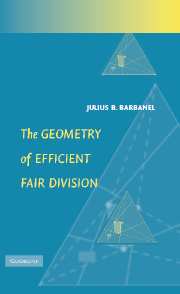
-
Select format
-
- Publisher:
- Cambridge University Press
- Publication date:
- August 2009
- January 2005
- ISBN:
- 9780511546679
- 9780521842488
- Dimensions:
- (228 x 152 mm)
- Weight & Pages:
- 0.738kg, 472 Pages
- Dimensions:
- Weight & Pages:
You may already have access via personal or institutional login
Book description
What is the best way to divide a 'cake' and allocate the pieces among some finite collection of players? In this book, the cake is a measure space, and each player uses a countably additive, non-atomic probability measure to evaluate the size of the pieces of cake, with different players generally using different measures. The author investigates efficiency properties (is there another partition that would make everyone at least as happy, and would make at least one player happier, than the present partition?) and fairness properties (do all players think that their piece is at least as large as every other player's piece?). He focuses exclusively on abstract existence results rather than algorithms, and on the geometric objects that arise naturally in this context. By examining the shape of these objects and the relationship between them, he demonstrates results concerning the existence of efficient and fair partitions.
Reviews
'In Chapters 12 and 13, he studies the relationship between the IPS and the RNS, and he provides a new presentation of the fundamental result that ensures the existence of a partition that is both Pareto optimal and envy-free.'
Source: Zentralblatt MATH
Contents
Metrics
Altmetric attention score
Full text views
Full text views help Loading metrics...
Loading metrics...
* Views captured on Cambridge Core between #date#. This data will be updated every 24 hours.
Usage data cannot currently be displayed.
Accessibility standard: Unknown
Why this information is here
This section outlines the accessibility features of this content - including support for screen readers, full keyboard navigation and high-contrast display options. This may not be relevant for you.
Accessibility Information
Accessibility compliance for the PDF of this book is currently unknown and may be updated in the future.


